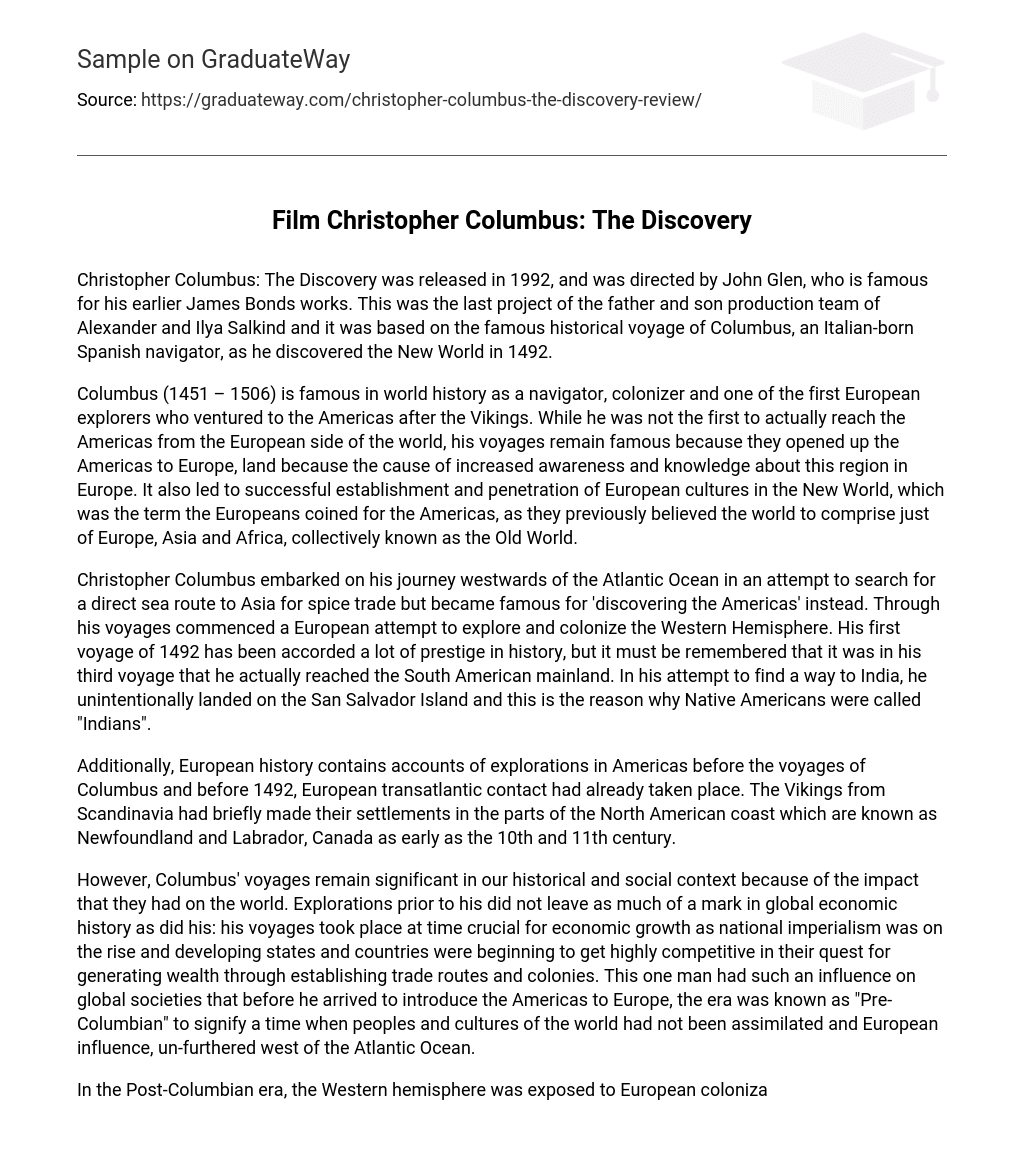Christopher Columbus: The Discovery was released in 1992 and directed by John Glen, known for his earlier James Bond works. It was the last project of the father and son production team of Alexander and Ilya Salkind. The film is based on the famous historical voyage of Columbus, an Italian-born Spanish navigator who discovered the New World in 1492.
Columbus (1451 – 1506) is famous in world history as a navigator, colonizer, and one of the first European explorers to venture to the Americas after the Vikings. Although he was not the first to reach the Americas from Europe, his voyages remain significant because they opened up this new land to Europe. This increased awareness and knowledge about this region in Europe led to successful establishment and penetration of European cultures in the New World. The term New World” was coined by Europeans who previously believed that the world comprised only of Europe, Asia, and Africa collectively known as the Old World.
Christopher Columbus embarked on a journey westwards across the Atlantic Ocean in an attempt to find a direct sea route to Asia for spice trade. However, he became famous for ‘discovering the Americas’ instead. His voyages initiated European exploration and colonization of the Western Hemisphere. Although his first voyage in 1492 is historically significant, it is important to note that he actually reached the South American mainland during his third voyage. While searching for a way to India, Columbus unintentionally landed on San Salvador Island, which led to Native Americans being called “Indians”.
Additionally, European history contains accounts of explorations in the Americas before the voyages of Columbus in 1492. In fact, European transatlantic contact had already taken place. The Vikings from Scandinavia briefly settled in parts of the North American coast known as Newfoundland and Labrador, Canada as early as the 10th and 11th centuries.
However, Columbus’ voyages remain significant in our historical and social context because of the impact they had on the world. Prior explorations did not leave as much of a mark in global economic history as his did. His voyages took place at a crucial time for economic growth, as national imperialism was on the rise and developing states and countries were beginning to compete highly in their quest for generating wealth by establishing trade routes and colonies.
This one man had such an influence on global societies that before he arrived to introduce the Americas to Europe, the era was known as Pre-Columbian” to signify a time when peoples and cultures of the world had not been assimilated, and European influence remained unfurthered west of the Atlantic Ocean.
In the Post-Columbian era, the Western hemisphere was exposed to European colonization. This had both positive and negative effects. Trade opened up, and there were exchanges of plants, animals, ideas, and cultures between two radically different worlds. However, at the same time, the negative effects of war, forced labor, and disease combined with the positive consequences to change the world forever.
This is the reason why Glen felt it was necessary to make a movie as a tribute to this legendary figure. The central character in the movie, Christopher Columbus: The Discovery, is played by George Corraface. He rejected the old theories of a flat world and proposed that in fact, the world was round. In an attempt to prove his theory right, he sets out eastward to reach India across the uncharted Ocean sea. His fellow Italian countrymen ridicule him and think his mission is preposterous.
He tries to secure financing for his expedition, but the Portuguese refuse to help him. He then travels to the Spanish court and asks Queen Isabella (played by Rachel Ward) and King Ferdinand (represented by Tom Selleck in the movie) for assistance. However, before they can grant him sponsorship, he must undergo a thorough inquisition by Tomas de Torquemada (Marlon Brando). Once he secures the necessary funding, he sets sail into the unknown East with three ships. The movie provides a comprehensive account of his journey, during which he faces numerous tumultuous events such as sabotage attempts by Portuguese spies and mutinous revolt from a rebellious crew. After successfully overcoming these difficulties, he reaches America – a mysterious land where he encounters its strange Indian inhabitants who have a society completely different from that which he had been exposed to in Europe.
John Glen, previously known for movies such as Octopussy and Iron Eagle 3-Aces, directed this movie in the true style of 1940s adventure movies. The Oceanic footage, as well as that of various scenic locales, is simply breathtaking. His depiction of Columbus as a modern man who was passionate in his belief that the world was not flat and that a new route to the East could be discovered – but was not perfect, as later accounts have shown – gives this movie an unconventional approach.
The acting by seasoned veterans like Marlon Brando and relative newcomers such as Benecio Del Toro and Catherine Zeta Jones is commendable. This movie succeeds in presenting the historical and social saga of Christopher Columbus in an action-packed adventurous light that is both informative and entertaining.
Bibliography
- Christopher Columbus: The Discovery. Retrieved November 15, 2007, from Wikipedia: http://en.wikipedia.org/wiki/Christopher_Columbus:_The_Discovery
- Christopher Columbus: The Discovery (1992). Retrieved November 15, 2007, from The Internet Movie Database: http://www.imdb.com/title/tt0103962/
- Christopher Columbus: The Discovery (1992)
- Christopher Columbus: The Discovery (1992). Retrieved November 15, 2007, from The Internet Movie Database: http://www.imdb.com/title/tt0103962/
- Christopher Columbus. (n.d.). In Microsoft® Encarta® Online Encyclopedia. Retrieved November 15, 2007 from http://encarta.msn.com/encyclopedia_761568472/Christopher_Columbus.html
- Christopher Columbus. (n.d.). In Wikipedia. Retrieved November 15,2007 from http://en.wikipedia.org/wiki/ Christopher_Columbus





